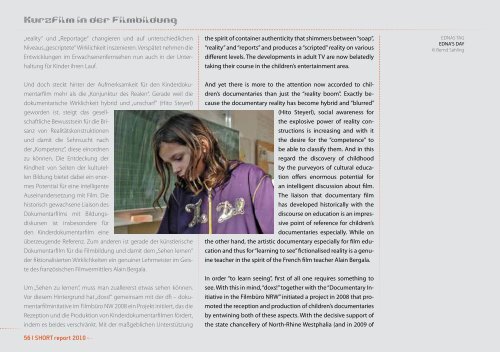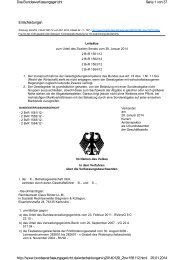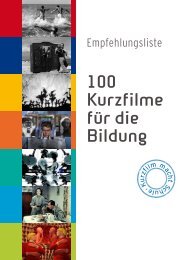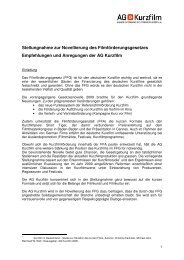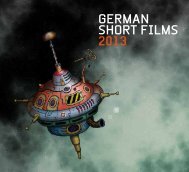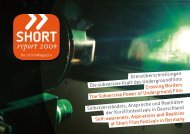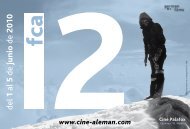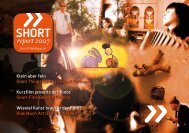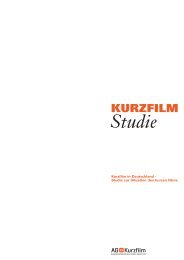short report - AG Kurzfilm
short report - AG Kurzfilm
short report - AG Kurzfilm
Erfolgreiche ePaper selbst erstellen
Machen Sie aus Ihren PDF Publikationen ein blätterbares Flipbook mit unserer einzigartigen Google optimierten e-Paper Software.
<strong>Kurzfilm</strong> in der Filmbildung<br />
„reality“ und „Reportage“ changieren und auf unterschiedlichen<br />
Niveaus „gescriptete“ Wirklichkeit inszenieren. Verspätet nehmen die<br />
Entwicklungen im Erwachsenenfernsehen nun auch in der Unterhaltung<br />
für Kinder ihren Lauf.<br />
Und doch steckt hinter der Aufmerksamkeit für den Kinderdokumentarfilm<br />
mehr als die „Konjunktur des Realen“. Gerade weil die<br />
dokumentarische Wirklichkeit hybrid und „unscharf“ (Hito Steyerl)<br />
geworden ist, steigt das gesellschaftliche<br />
Bewusstsein für die Brisanz<br />
von Realitätskonstruktionen<br />
und damit die Sehnsucht nach<br />
der „Kompetenz“, diese einordnen<br />
zu können. Die Entdeckung der<br />
Kindheit von Seiten der kulturellen<br />
Bildung bietet dabei ein enormes<br />
Potential für eine intelligente<br />
Auseinandersetzung mit Film. Die<br />
historisch gewachsene Liaison des<br />
Dokumentarfilms mit Bildungsdiskursen<br />
ist insbesondere für<br />
den Kinderdokumentarfilm eine<br />
überzeugende Referenz. Zum anderen ist gerade der künstlerische<br />
Dokumentarfilm für die Filmbildung und damit dem „Sehen lernen“<br />
der fiktionalisierten Wirklichkeiten ein genuiner Lehrmeister im Geiste<br />
des französischen Filmvermittlers Alain Bergala.<br />
Um „Sehen zu lernen“, muss man zuallererst etwas sehen können.<br />
Vor diesem Hintergrund hat „doxs!“ gemeinsam mit der dfi – dokumentarfilminitative<br />
im Filmbüro NW 2008 ein Projekt initiiert, das die<br />
Rezeption und die Produktion von Kinderdokumentarfilmen fördert,<br />
indem es beides verschränkt. Mit der maßgeblichen Unterstützung<br />
56 | ShOrT <strong>report</strong> 2010 e<br />
the spirit of container authenticity that shimmers between “soap”,<br />
“reality” and “<strong>report</strong>s” and produces a “scripted” reality on various<br />
different levels. The developments in adult TV are now belatedly<br />
taking their course in the children’s entertainment area.<br />
And yet there is more to the attention now accorded to children’s<br />
documentaries than just the “reality boom”. Exactly because<br />
the documentary reality has become hybrid and “blurred”<br />
(Hito Steyerl), social awareness for<br />
the explosive power of reality constructions<br />
is increasing and with it<br />
the desire for the “competence” to<br />
be able to classify them. And in this<br />
regard the discovery of childhood<br />
by the purveyors of cultural education<br />
offers enormous potential for<br />
an intelligent discussion about film.<br />
The liaison that documentary film<br />
has developed historically with the<br />
discourse on education is an impressive<br />
point of reference for children’s<br />
documentaries especially. While on<br />
the other hand, the artistic documentary especially for film education<br />
and thus for “learning to see” fictionalised reality is a genuine<br />
teacher in the spirit of the French film teacher Alain Bergala.<br />
In order “to learn seeing”, first of all one requires something to<br />
see. With this in mind, “doxs!” together with the “Documentary Initiative<br />
in the Filmbüro nRW” initiated a project in 2008 that promoted<br />
the reception and production of children’s documentaries<br />
by entwining both of these aspects. With the decisive support of<br />
the state chancellery of north-Rhine Westphalia (and in 2009 of<br />
EDNAS T<strong>AG</strong><br />
EDnA’S DAY<br />
© Bernd Sahling


